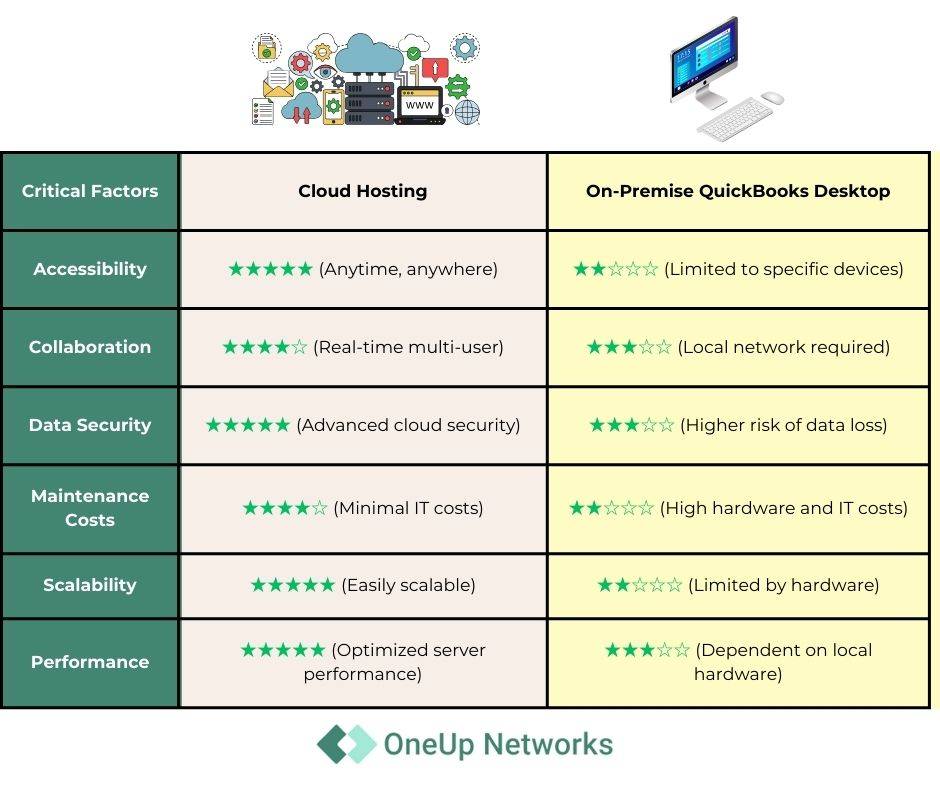For many accountants and small businesses, QuickBooks is the cornerstone of their financial operations. Traditionally, QuickBooks has been hosted on desktop computers, with all data stored locally. However, as businesses grow and require more flexibility, security, and collaboration, many are considering making the switch to cloud hosting. This guide will walk you through the ins and outs of QuickBooks Enterprise cloud hosting or in other words QuickBooks on the cloud, why you should consider it, and how to make the transition smoothly.
What is QuickBooks Cloud Hosting?
QuickBooks cloud hosting refers to running your QuickBooks software on a remote server rather than on a local desktop or on-premise server. With QuickBooks Hosting services, your data and application are accessible from anywhere, at any time, through a secure web connection. This setup mimics the feel of QuickBooks Desktop, but with added mobility and flexibility for users. Unlike QuickBooks Online, which offers limited features compared to its desktop counterpart, QuickBooks hosting retains all the advanced functionalities while giving users cloud-like access.
Whether you’re using any version of QuickBooks – Pro, Premier, or Enterprise, QuickBooks Server Hosting allows you to work in the same familiar environment with the added benefit of cloud accessibility. It’s a best-of-both-worlds solution for accounting and finance professionals.
Choosing the Right Hosting Option for Your Business!
When it comes to QuickBooks Desktop Enterprise hosting, different businesses have different needs, and the right hosting environment can make all the difference. Here’s a breakdown of the most common styles:
Dedicated Hosting:
- This option is ideal for larger businesses that require more control over their server environment. With dedicated QuickBooks Web Hosting, you get exclusive access to a server, offering maximum performance and security. It is highly customizable and is often preferred by businesses with specific compliance needs.
Shared Hosting:
- In this setup, multiple businesses share a server, which makes it a more affordable option. Shared hosting is great for small to medium-sized businesses that don’t need full server control but still want the benefits of QuickBooks hosting. It’s a cost-effective way to enjoy cloud benefits without heavy upfront investments.
Peer-to-Peer Hosting:
- Suitable for smaller teams, this model allows multiple users to access a single instance of QuickBooks, but it relies heavily on local networking. It’s more affordable but offers limited scalability and requires strong IT infrastructure on-site.
Alternate Hosting:
- This option is a hybrid of local hosting and cloud hosting, where you maintain some of your QuickBooks processes locally while leveraging cloud hosting for accessibility and backup. This style is often seen in businesses that are transitioning to a full cloud solution.
Transitioning to the Cloud: Moving Your QuickBooks Data
One of the biggest concerns businesses face when considering QuickBooks Hosting services is the migration process. Moving QuickBooks Desktop company files to the cloud might seem daunting, but with the right guidance, it can be a smooth transition. Here’s how you can move your data:
Hosting on Cloud:
- If you opt for QuickBooks Server Hosting, your provider will handle the setup. This involves securely migrating your existing company files from your desktop to the cloud server. Once on the cloud, you can access your files from anywhere using your login credentials and work collaboratory on real time.
QuickBooks Online:
- Some businesses choose to transition to QuickBooks Online, a cloud-based alternative to the desktop version. However, QuickBooks Online doesn’t offer the full functionality of the desktop versions, so be sure to assess your needs before switching.
Remote Desktop Services (RDS):
- RDS is a solution where QuickBooks remains on your desktop, but you access it through a remote desktop connection. This setup is less flexible than full cloud hosting but still offers some mobility.
VPN and RDP:
- A Virtual Private Network (VPN) and Remote Desktop Protocol (RDP) provide another way to access QuickBooks remotely. However, these methods can be complex to set up and maintain and might not offer the same level of security as cloud hosting.
Browser-Based Access:
- Some hosting providers allow you to access your QB directly through a web browser, making it easy to work on any device without needing additional software installations.
When is it Time to Switch to QuickBooks Hosting?
Switching to QuickBooks Hosting isn’t just about jumping on the cloud bandwagon. Timing is critical. Here are some signs it might be time for your business to make the switch:
- Need for Remote Access: If your team with any number of users are increasingly working from home or across multiple locations, cloud hosting allows seamless access to QuickBooks from anywhere.
- Scalability Issues: As your business grows, your on-premise QuickBooks may struggle to keep up. QuickBooks Hosting providers allow you to scale your resources up or down without investing in new hardware.
- Data Security Concerns: If you’re worried about the security of your financial data on local servers, moving to the cloud can offer enhanced protection through encryption, firewalls, and regular backups. For more details, we have created a separate FAQ page to answer all the questions based on our research.
- Collaboration Needs: Cloud hosting allows multiple users to access and work on QuickBooks simultaneously, improving collaboration among team members and across departments.
- Software Upgrades and Maintenance: Maintaining software on multiple desktops can be cumbersome. Hosting QuickBooks on the cloud ensures that all users are working on the latest version without the need for individual upgrades.
The Limitations of On-Premise QuickBooks Solutions-
On-premise QuickBooks product solutions, while familiar, come with several limitations that can hinder business growth:
- Limited Access: On-premise setups restrict access to QuickBooks to specific devices and locations, limiting flexibility for remote teams.
- High Maintenance Costs: Managing local servers requires regular maintenance, upgrades, and security protocols, all of which add to operational costs.
- Data Vulnerability: Storing data locally exposes it to risks like hardware failure, data breaches, and natural disasters, jeopardizing sensitive financial information.
- Scalability Challenges: As your business grows, you may find your on-premise infrastructure insufficient to meet your expanding needs. Adding new users or features often requires costly upgrades to hardware and software.

Why QuickBooks Hosting Is the Future for Businesses?
Switching to QuickBooks hosting can transform the way your business operates. Here’s how:
- Accessibility: Whether you’re working from home, in the office, or on the go, you can access your QuickBooks data securely from any device with an internet connection. This option provides you anytime anywhere access.
- Cost-Effective: QuickBooks Hosting or application hosting eliminates the need for costly on-premise servers and IT maintenance. With a hosting provider, you pay a predictable monthly fee and get access to the latest hardware, software, and security protocols.
- Data Security: Hosting providers implement top-tier security measures like encryption, firewalls, and regular backups, ensuring that your data is safe from cyber threats and disasters.
- Improved Collaboration: Multiple users can access the same QuickBooks Online files simultaneously, streamlining collaboration and reducing the chances of errors or data duplication.
- Scalability: QuickBooks online advanced Hosting allows your business to scale easily. As your needs grow, you can upgrade your resources without the hassle of purchasing new equipment or installing software on multiple machines.
- Enhanced Performance: Cloud hosting providers offer powerful server environments that ensure your QuickBooks runs smoothly, even during peak times.
How OneUp Networks Can Help?
At OneUp Networks, we specialize in providing customized application hosting including QuickBooks Enterprise Hosting solutions tailored to the unique needs of accounting and financial professionals. Whether you’re a small business owner looking to reduce IT costs or a large firm in need of enhanced security and scalability, we’ve got you covered.
With over a decade of experience in the cloud hosting industry, we understand the pain points of transitioning from on-premise to cloud hosting. We work closely with our clients to ensure a seamless migration, with minimal disruption to your daily operations. Our team of experts is available 24/7 to provide support and help you get the most out of your cloud-hosted QuickBooks environment.
Example: One of our clients, a mid-sized accounting firm, struggled with outdated on-premise servers that couldn’t handle their growing client base. We migrated their QuickBooks Enterprise to the cloud, enabling their entire team to work from any location, ensuring uninterrupted service during the busiest tax season. The result? A 30% increase in productivity and a significant reduction in IT maintenance costs.
Switching to QuickBooks Enterprise Hosting might seem like a big step, but with the right partner, it can be a smooth and rewarding transition. At OneUp Networks, we’re committed to helping our clients achieve their business goals through cutting-edge hosting solutions. Reach out to us today to learn how we can help you make the switch to the cloud and unlock the full potential of QuickBooks for your business.














